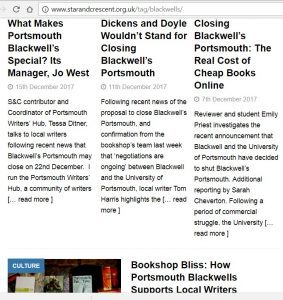William Sutton's Blog, page 17
March 8, 2018
And Another Thing: Hitchhiker’s Guide to the Galaxy returns
It’s Douglas Adams season on BBC Radio. I gave a talk on him in University of Portsmouth CCI last term. I will happily regale anyone who asks me with the full powerpoint and my rendition of Vogon poetry. Of my audience of 50, three knew his work.

Now is your chance. Once again, enjoy:
Jim Naughtie’s Bookclub interview

John Lloyd interviewed by Clive Anderson on Chain Reaction
Robbie Stamp, Adams’ collaborator, movingly in discussion with his posthumous friend
Steve Cross’ Boring Talk – The End of the World, close reading Hitchhiker’s Guide
Front Row preview of HHGG part VI
All episodes of Hitchhiker (some available on demand) & Omnibus’ celebration of Life, the Universe and Douglas Adams

and the all new production of Eoin Colfer’s contribution to the trilogy, Hexagonal Phase: And Another Thing

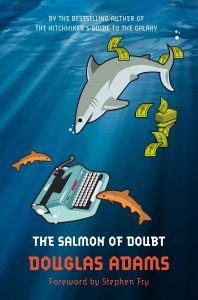
Please Feel Free to Share:









March 6, 2018
Valediction to Blackwell’s Portsmouth: adieu, mes amis.
In farewell to Blackwell’s Portsmouth – woe and alack – I here post my song in their honour, and pics of 1/10th of the events they’ve supported me and my Portsmouth Writers’ Hub chums through.
Welcome, everybody, to Blackwell’s Pompey Shop.
We may not be the most extensive but in terms of quality we are the top.
We’ve Star & Crescent, Bookfest,
We’ve Portsmouth Writers Hub,
Day of the Dead, and on Valentine’s
We’ll be storytelling in Wave Maiden pub
So if you hear some dullard strop that Portsmouth ain’t a literary stop
We’re thrice as bookish as that lot– proof of the pud’s in Blackwell’s Bookshop.
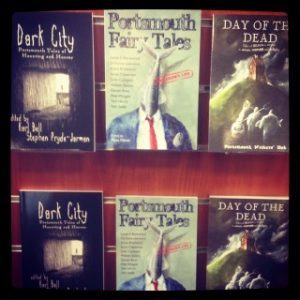
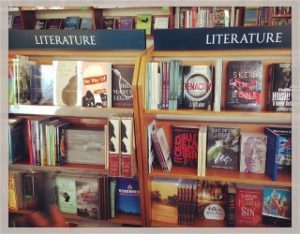
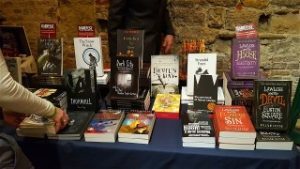
Pride of place on the shelves…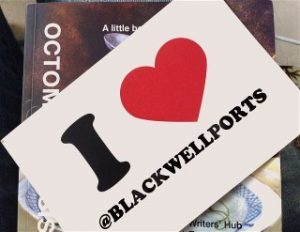
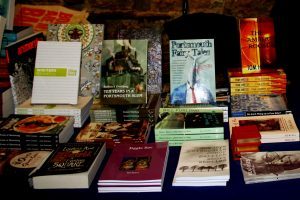
for launches of our collections, Dark City, Portsmouth Fairy Tales, Octomorphosis, and Day of the Dead;
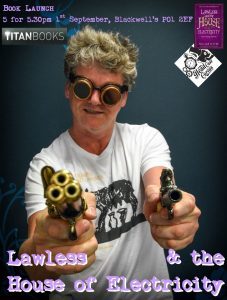
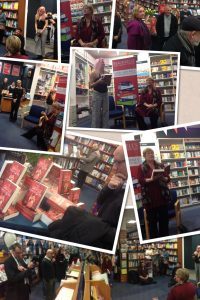
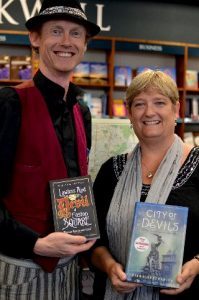
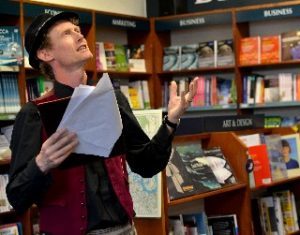
my Lawless launches, Books 1, 1, 2 and 3, with Diana Bretherick, my brother John…
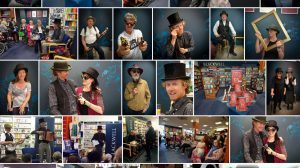
… and most of the rest of Portsmouth; more lauch pics here
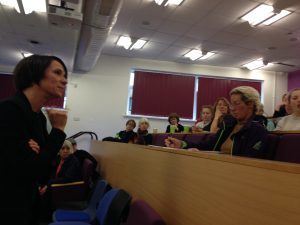
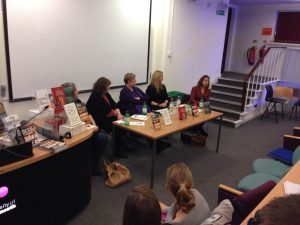
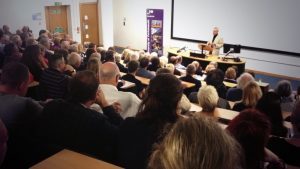
In Bookfest, for events such as Polly Morland’s Metamorphosis, Diana Bretherick’s Femmes Fatales, Graham Hurley at Uni;
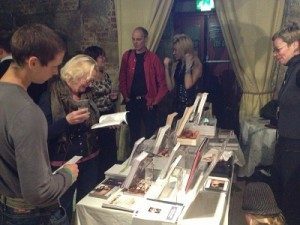
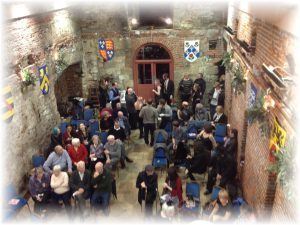
In Darkfest, here, there and everywhere, not forgetting Day of the Dead i, ii, iii,
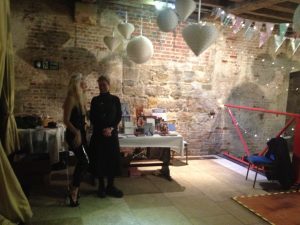
Day of the Dead iv and v; more pics of this
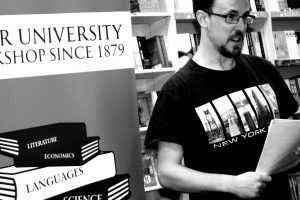

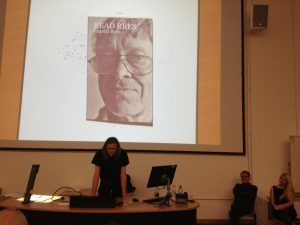
friends’ book launches historical, suspenseful, nordic;
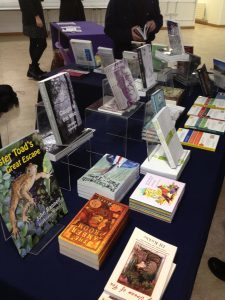
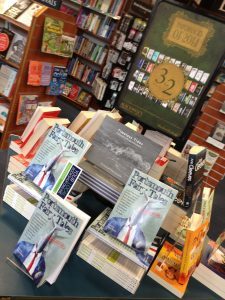
nightmarish, nonsensical, steampunkery, historical, hysterical, Victorianist, gothic, mythic and memoirish;
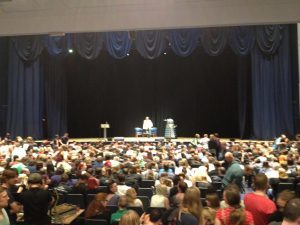

and that glorious night at the Guildhall that proved Portsmouth ain’t so illiterate with thousands flocking to have Neil Gaiman sign their books, and Jo supporting him (with his multiple signing pens) until 2am in the morning.
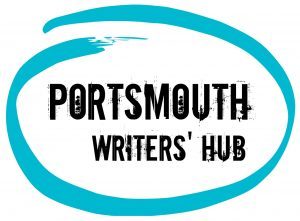
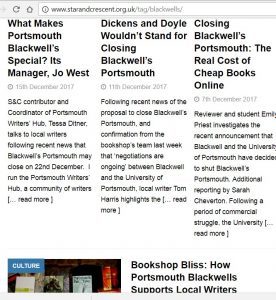
And here all our laments for Blackwell’s passing. Thanks, Jo, Brian, Ness and all.
Please Feel Free to Share:









Reclaim the News: free local journalism course

A message from friends in Star and Crescent about their FREE local journalism training course, applications open now.

Star & Crescent recently launched our new and FREE local journalism training course, delivered in partnership with the Centre for Investigative Journalism.
The course is open to all local residents with a passion for Portsmouth and an interest in improving the quality of local news in the city – no previous experience in writing or journalism is required, just lots of enthusiasm!
From 21st April, the S&C team will be joined by national experts and journalists over 10 weeks to train participants in a range of areas relating to investigative and community journalism. Alongside their training each week, participants will be supported and mentored to write at least one story for publication on S&C from July 2018.
The course will cover a range of techniques and issues relating to local journalism, including: the basics of reporting news and feature articles; media law and ethics; and how to use the Freedom of Information Act to write news stories.
You can find out more information about the course on the website here: www.starandcrescent.org.uk/2018/02/14/reclaimthenews-apply-for-our-free-local-journalism-course/
Please feel free to forward this email with your networks. We are aiming to get as diverse a representation of Portsmouth communities as we can, so please help us spread the word! Applications close on 17th March 2018.

If you have any questions, please don’t hesitate to contact Sarah at editor at starandcrescent dot org dot uk
Many thanks,
Sarah Louise Cheverton
Editor-in-Chief
Star & Crescent
T: @CheverSar
Read Sarah in the Huffington Post and on
Women’s Views on News
Writer in Residence, Aurora New Dawn
Please Feel Free to Share:









March 3, 2018
Farewell to Blackwell’s #5: Death of a Bookshop
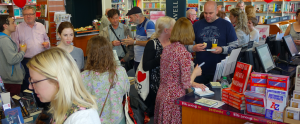
Matt Wingett, author, writes a heartfelt piece to mark the closing of Blackwell’s in Portsmouth: The Death of a Bookshop – full article on Matt’s website
“Blackwell’s wasn’t only about commerce. It was about humanity in a wider sense. It was about standing up to the cost-benefit analysis view of life and saying “what we do, what we think, is vital because it is human, despite you” in the face of the machinery of bean-counting that pays lip service to such ideas, but sacrifices culture and ideas to its own calculating God, Mammon.”
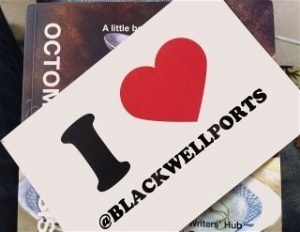
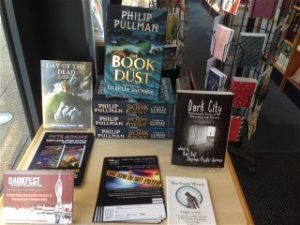
“My call, now, is that in its passing, we continue the rites enacted at Blackwell’s Portsmouth, and work to preserve culture. That we do so, despite the decisions of businesses like Blackwell’s Bookshop UK, and the value-free institution that is the University of Portsmouth.”
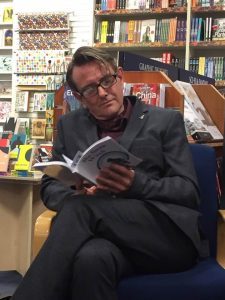
https://www.mattwingett.com/the-death-of-a-bookshop-blackwells-portsmouth/
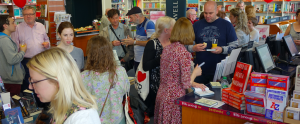
See also Star and Crescent‘s articles celebrating our local bookshop and lamenting its closure.
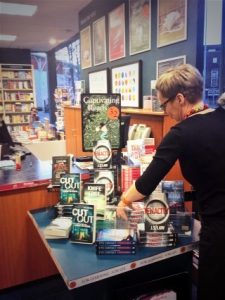
Please Feel Free to Share:









March 2, 2018
Farewell to Blackwell’s #4: Bookshop Bliss
Star and Crescent have run a series of articles celebrating our local bookshop and lamenting its threatened closure. Alas, we are too late.
Here’s my contribution: Bookshop Bliss – full article on Star & Crescent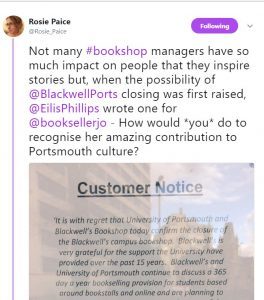

“Writers write alone. It’s what we do. It’s how we are. But, but, but… sometimes it is hard. And when it is, where better to look for a focal point than your local bookshop?
I have always loved bookshops, as much as libraries. I seek them out whenever I am in a new town. When I hear of a good bookshop, I am more likely to visit that area: Oxford’s Broad St, Wigton, London’s Judd Street, Hay-on-Wye, the Seine in Paris, under Waterloo Bridge.
Can’t I buy online? Where’s the fun in that? And if we book lovers buy online, there will soon be no bookshops left.”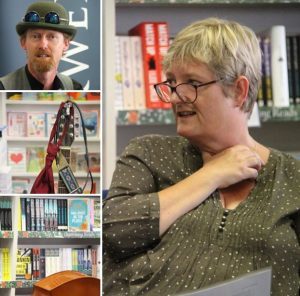

Fun times in Blackwell’s
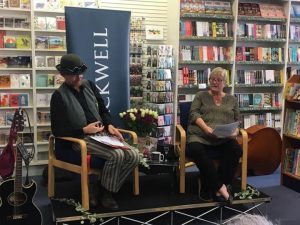
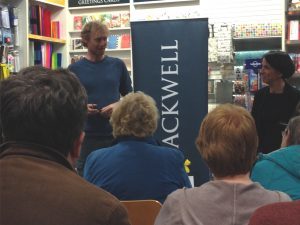
Please Feel Free to Share:









Farewell to Blackwell’s #3: Emily Priest, Real Cost of Books Online
Star and Crescent have run a series of articles celebrating our local Blackwell’s bookshop and lamenting its threatened closure. Alas, we are too late.

Here’s Emily Priest’s contribution:
The Real Cost of Cheap Books Online (full article on Star and Crescent)
‘”The sad thing is that people see Amazon and the internet as their first point of call. There is a need in higher education to promote deep reading of textbooks rather than just what’s online.”
… Bookshops across the country have been placed under pressure as a result of the rise in internet shopping and online giants such as Amazon. In March 2017, the Bookseller Association reported the number of independent bookshops in the UK had fallen for the 11th year in a row, although the rate of closure has slowed. ‘
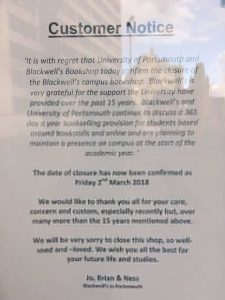
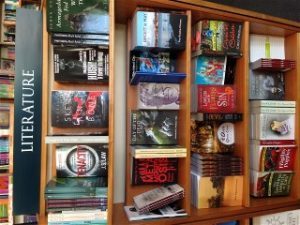
Please Feel Free to Share:









March 1, 2018
Reliable Libel
Thanks to Historia Magazine editor Katherine Clements for including this on HWA’s website in autumn 2017.
TRADUCING THE PAST
Do you worry about misrepresenting historical figures?
“You faithless writer,” cry my characters, as I attribute to them words and attitudes they would renounce.
Tom Stoppard, in Travesties, took care to give Lenin only speeches that were historically attributed to him. But with his main character, Henry Carr, he was more daring. Carr’s fame (reported in Ellmann’s biography of James Joyce) rested on his quarrel with the great author over a pair of trousers he’d bought to play Algernon in Joyce’s production of The Importance of Being Earnest.
How surprised Stoppard was, after his play opened, to receive a letter from Carr’s widow. Thankfully, she was generous about any misrepresentation.
How would you feel if you received a letter from a relative of your character (especially if you’d portrayed them cavalierly and unflatteringly)?
If they’re dead, is it still libel?
I have made a prince behave like a cad. I’ve made a famous engineer unwitting accomplice to conspiracy. I’ve put an erotic memoirist at the heart of a network that would trouble Operation Yew Tree. Might their descendants demand restitution?
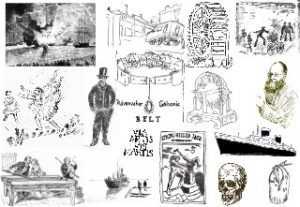
Top ten Traducements
Here is a cricket team of real people I have casually introduced into my fiction. Only now, as I write about it, do I worry whom I have traduced and whom represented faithfully.
Charles Dickens
Prince Albert
John Camden Hotten, publisher
Edward Lear
Wilkie Collins
Bertie, Prince of Wales
Skittles (Catherine Walters/Anonyma), courtesan
Kitty Hamilton, bawd-house madam
Walter, author of My Secret Life
William Armstrong (my Earl of Roxbury)
Joseph Bazalgette, engineer
12th men Jenny Marx, The Crippled Nutmeg-Grater Seller, The Hot-Potato Seller
How well should we know our characters? How well can we?
Some writers demand total rigour; some alter the world a little, others a lot. Romantic historical novelist Diana Gabaldon was agonising over a detail of Jacobite clothing. Her exasperated husband was puzzled, in books that begin with time travel from a stone circle, that she worried about such details. Her reply was curt.
We historical novelists, I’d suggest, set ourselves a standard. Often those with the wildest plots are the greatest sticklers for realistic journey times, accurate clothing and pinpoint language. I spend forever on Google Ngrams, checking for anachronistic language.
Errors, inevitably, creep in. I was called out in my first ever review (Allan Massie, The Scotsman) for attributing whiskers to cricketer WG Grace’s brother, EM Grace. That showed a level of detail I had not expected. Nobody pointed out that Bertie, Prince of Wales, whom I teased for his rotundity, was at 21 a willowy youth.
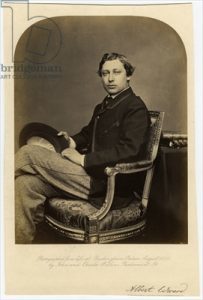 Albert Edward, Prince of Wales, 1861 by Watkins, John & Charles
Albert Edward, Prince of Wales, 1861 by Watkins, John & Charles
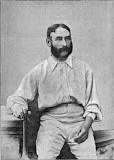
Whiskery EM Grace and Bertie (later Edward VII) – not rotund yet?
We are all grateful (through gritted teeth) to friends and editors who spot such anachronisms: the Criterion Theatre was not around in 1864; “zounderkite” is not attested in the period, despite pop slang sites. More problematic was this edit suggested for Lawless & the House of Electricity. I mentioned priest-holes during Tudor persecution. My editor said Elizabeth I was more accurate than Henry VIII:
I’ve read of hapless priests hiding from Elizabeth I’s torturers.
Historically better – except that Elizabeth was not known as Elizabeth I in 1864. She was plain Elizabeth, until there was an Elizabeth II. We spotted that error just in time.
I fought over the diagnosis of Lady Elodie’s illness in this book. “What would the illness be diagnosed as today?” she demanded.
“That’s not relevant,” I replied. “And why do we assume we’d be right, and they were wrong?”
She was right to ask. It led to this plea in my afterword note on sources:
I urge you to consider the catalepsy-lethargy-somnambulism cycle of Charcot’s Saltpêtrière hysterics, dissected brilliantly by Asti Hustvedt in Medical Muses: Hysteria in Nineteenth-Century Paris .
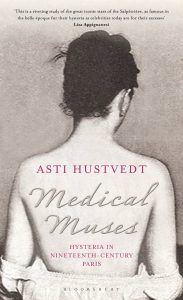
Perhaps, just as we laugh at Victorian diagnoses such as strolling congestion, drawing room anguish, dissipation of nerves and imaginary female trouble (factors cited upon commitment to a Victorian asylum), we should think how today’s diagnoses will be laughed at in the future.
Getting to know them
There are errors and oversights, and there is traducement.
How well do you get to know your characters? While writing my first novel, I was a Victorian novice. I asked friends: who was in London in 1859, as the Metropolitan Line entered construction? Who should I include? Answers came swiftly: Marx, Dickens, George Eliot, Thackeray, Trollope, Edward Lear, pre-Raphs. They threw in Magwitch, Raskolnikov and a cavalcade of fictional characters.
I had no idea how deeply I would end up in this world. As Historia readers will know, the deeper you get, the more you realise you know nothing.
Period background I gleaned from Peter Ackroyd’s inspired book on Dickens. Judith Flanders’ The Victorian House generated detail. A visit to the Geffrye Museum opens the eyes to differences between eras, attuning the eye to style, colour, pattern and textures. A film clip of 1890s Tower Bridge at the Museum of London conveyed the mayhem of traffic better than contemporary accounts – for them, it was normal. Why describe it? Police reports on Lee Jackson’s Victorian London site give the flavour of their prose, accents and slang, unashamed identification of criminal types, and moral undertones through so much of life.
I’ve wasted time too. I read a Disraeli biography, then cut him. (Even his one line about “climbing the greasy pole” of politics.) I read a book on the Geneva Convention, then cut its founder, Henri Dunant.
Princes, Politicians, Prostitutes
Must we represent them fairly, these past figures we dare to reanimate? I like to know them well enough to orchestrate their voices and intentions, but not so well I’d feel ashamed of making them spout whatever claptrap I wish them to voice.
The hugely famous I treat reverentially. Dickens appears sparingly: two lines in my first novel and one in my second, our detective reticent about their acquaintance. To Prince Albert I attribute only sentiments lifted verbatim from his letters, as Stoppard with Lenin. Albert’s son, Bertie (later Edward VII), is a different matter.
For lesser celebrities, I’m take risks. I place publisher John Camden Hotten in Holywell Street, peddling pornographic novels. Hotten penned the wonderful Dictionary of Modern Slang, Cant, and the Vulgar Tongue. Should I feel ashamed of placing him in such sordid environs? Not really: he also penned Lady Bumtickler’s Revels and published Swinburne’s scurrilous poetry.
I feel I know Edward Lear from Vivien Noakes’ Edward Lear: The Life of a Wanderer; but I had to steer clear of knowing exactly where he was day by day (as recorded on Marco Graziosi’s Lear website). Likewise, I am cavalier with Wilkie Collins; but Andrew Lycett’s biography A Life of Sensation backs up the ebullient bonhomie, opiates and sybaritic jaunts I accord to him.
Deliberate Misrepresentation
Who have I most roundly misrepresented?
Joseph Bazalgette strides through my first book, a triumphant hero redeeming London from the scourge through his sewerage. Researching my third, I discovered contemporary accusations of false practices, even bribery, in the proposal and design stage. So I’ve put him in again, reeling from these allegations.
Bertie, Prince of Wales, we know from the history books and law court records (and fiction such as Peter Lovesey’s mysteries). I don’t regret making him consort with famous courtesan Skittles; I made the most of his real teenage dalliance with dancing girl Nellie Clifden.
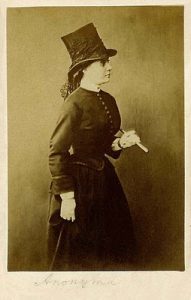
Skittles herself proved one of my readers’ favourites in Lawless and the Flowers of Sin. So much was written of her at the time – riding in Rotten Row, Gladstone sending boxes of tea, conquests in Paris – it’s hard to allege anything that would offend her or her admirers. I did invent her association with famous madame Kate Hamilton (and Kate doesn’t come off as kindly).
‘Walter’ the pseudonymous author of My Secret Life is perhaps the character I worst traduce. We cannot be sure of his identity (most likely erotobibliomaniac Henry Spencer Ashbee, creator of the Index Librorum Prohibitorum). I used this uncertainty to create JW Brodie, a Jekyll/Hyde impresario who bestrides London like a spidery colossus, orchestrating crimes worse than Walter ever admitted to.
The Crippled Nutmeg-Grater Seller was interviewed by Henry Mayhew: his story made me weep. I couldn’t resist giving his story fresh voice, with added volubility, in my character Bede, the storyteller in Flowers of Sin.
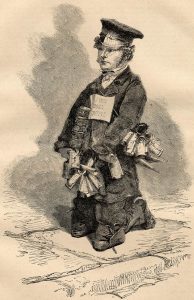
For my new book, I had already invented my House Of Electricity before learning of Cragside, home of Baron Armstrong, the electro-magus of the north. I loved Henrietta Heald’s glorious William Armstrong: Magician of the North. But I kept my right to fictionalise by creating my Earl of Roxbury, melding attributes of Armstrong with other industrialists past and present. I also wanted to tell a tale of family life (like Nancy Mitford’s The Pursuit of Love) – and Armstrong had no children.
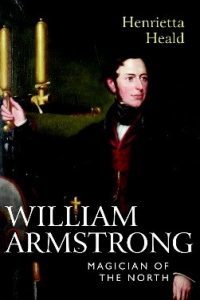
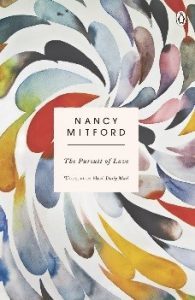
Should I feel compunction?
It turns out that Tom Stoppard did misrepresent Henry Carr. He made him a self-regarding draft-dodger, around which Joyce, Lenin and Dadaist Tristan Tzara humorously investigate twentieth century culture. In truth, far from evading the draft, Carr was a prisoner of war, sent to Switzerland through an amnesty because he was wounded. Thank goodness his widow didn’t complain.
How well should we know our characters? How well can we? After all, perhaps contemporary accounts are just as unreliable. If we steered clear of unknowables, we would have no historical fiction at all. No Eagle of the Ninth, no Saxon Stories, no Rob Roy, no Tale of Two Cities. No Iliad.
We can only research so far.
Lawless & the House of Electricity by William Sutton, third in his series of Lawless mysteries exploring the darker sides of Victorian London, is published by Titan Books .
Please Feel Free to Share:









Farewell to Blackwell’s #2: Tessa Ditner
What Makes Portsmouth Blackwell’s Special? Its Manager, Jo West

I run the Portsmouth Writers’ Hub, a community of writers on the south coast with over 600 members online. Recently, our Facebook group has been shocked by the news that Portsmouth’s Blackwell’s bookshop on Cambridge Road may be closing.
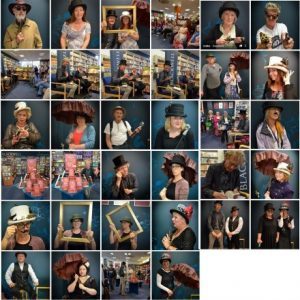

Please Feel Free to Share:









February 28, 2018
Farewell to Blackwell’s #1: Tom Harris/Dickens/Conan Doyle
“Not many
Star and Crescent have run a series of articles celebrating our local bookshop and lamenting its threatened closure. You can find them here.
Here is novelist Tom Harris:
Dickens and Doyle Wouldn’t Stand for Closing Blackwell’s Portsmouth
Blackwell’s Portsmouth and the University of Portsmouth are two institutions incredibly close to my heart, but the announcement that the University has made its intentions clear to evict – and with no alternative location yet agreed, to close – Blackwell’s has left me and the local writing community reeling.

Alas, we are too late. What a boost it has been to local writing to have such support.
Here’s the petition that shot to over 1000 signatures.
Please Feel Free to Share:









February 24, 2018
Jamie & the Jets & more: Clerkenwell ARTSlab
This Monday, Feb 26th, you can see Jamie and the Jets in Clerkenwell ARTSlab, hosted by our goodly friends Diego Brown and the Good Fairy from 8.30pm on.
We are a four-piece band: guitar, cor anglais, percussion, bass/double bass, and vocals galumphing and galore. We’ll be playing five or six songs, even nicer than this one.
I advise that it is worth a look.
Gabriel Moreno, Jamie & the Jets & more: Clerkenwell ARTSlab
Please Feel Free to Share:










